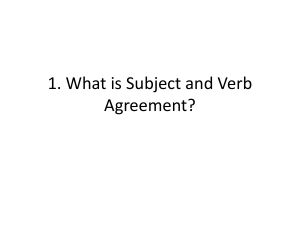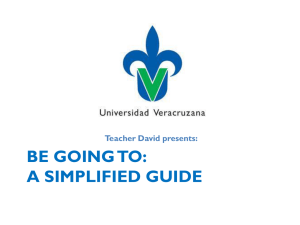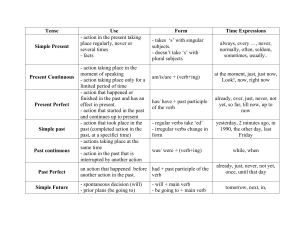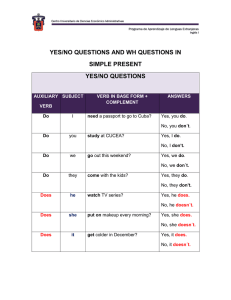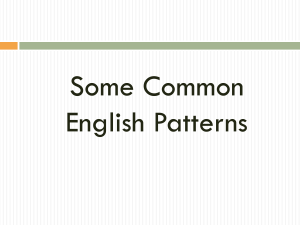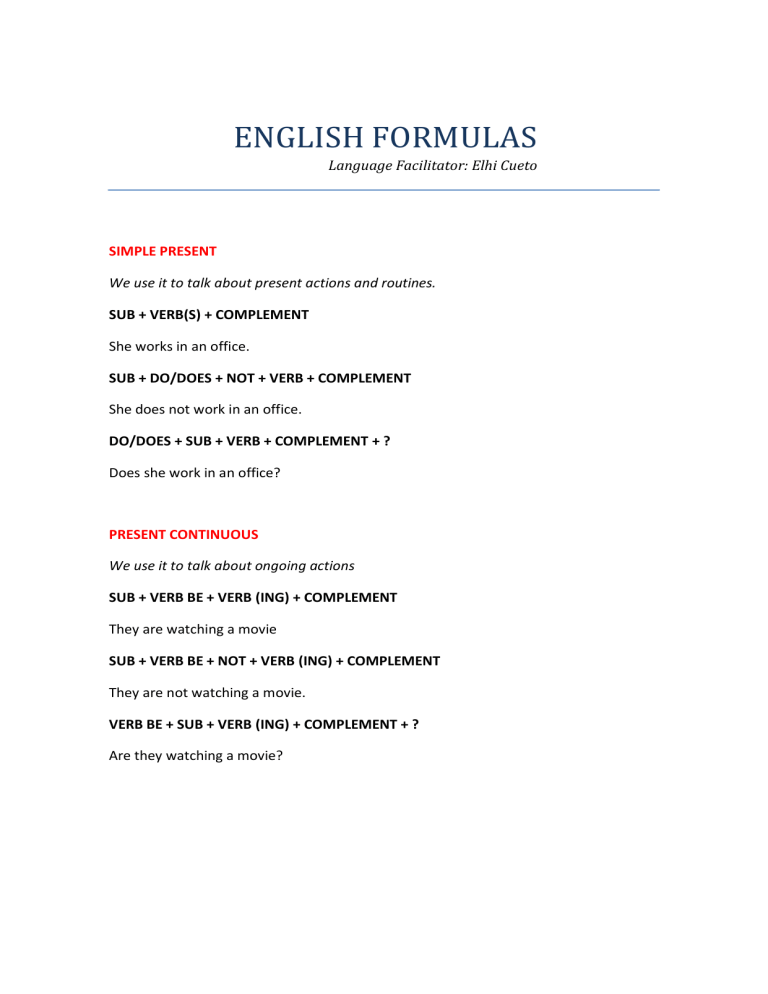
ENGLISH FORMULAS Language Facilitator: Elhi Cueto SIMPLE PRESENT We use it to talk about present actions and routines. SUB + VERB(S) + COMPLEMENT She works in an office. SUB + DO/DOES + NOT + VERB + COMPLEMENT She does not work in an office. DO/DOES + SUB + VERB + COMPLEMENT + ? Does she work in an office? PRESENT CONTINUOUS We use it to talk about ongoing actions SUB + VERB BE + VERB (ING) + COMPLEMENT They are watching a movie SUB + VERB BE + NOT + VERB (ING) + COMPLEMENT They are not watching a movie. VERB BE + SUB + VERB (ING) + COMPLEMENT + ? Are they watching a movie? SIMPLE PAST We use it to talk about past actions and events. SUB + VERB (PAST) + COMPLEMENT You went to the movies SUB + DID + NOT + VERB + COMPLEMENT You did not go to the movies. (didn’t) DID + SUB + VERB + COMPLEMENT + ? Did you go to the movies? WQ + DID + SUB + VERB + COMPLEMENT + ? When did you go to the movies? I went to the movies yesterday. FUTURE GOING TO We use it to talk about plans for the future. SUB + VERB BE + GOING TO + VERB + COMPLEMENT We are going to go to the mountains. SUB + VERB BE + NOT + GOING TO + VERB + COMPLEMENT We are not going to go to the mountains. VERB BE + SUB + GOING TO + VERB + COMPLEMENT + ? Are we going to go to the mountains? PRESENT PERFECT We use it to talk about past actions with present relevance. SUB + HAVE/ HAS + VERB (PARTICIPLE) + COMPLEMENT She has eaten Mexican food. SUB + HAVE/HAS + NOT + VERB (PARTICIPLE) + COMPLEMENT She has not eaten Mexican food. HAVE/HAS + SUB + VERB (PARTICIPLE) + COMPLEMENT + ? Has she eaten Mexican food? PRESENT PERFECT CONTINUOUS We use it to talk about a past action that continues in the present. SUB + HAVE/ HAS BEEN + VERB (ING) + COMPLEMENT You have been studying all night. SUB + HAVE/HAS + NOT + BEEN +VERB (ING) + COMPLEMENT You have not been studying all night. HAVE/HAS + SUB + BEEN +VERB (ING) + COMPLEMENT + ? Have you been studying all night? PAST CONTINUOUS We use it to talk about continuous actions in the past SUB + WAS/WERE + VERB(ING) + COMPLEMENT They were running in the park. SUB + WAS/WERE + NOT + VERB (ING) + COMPLEMENT They were not running in the park. WAS/WERE + SUB + VERB (ING) + COMPLEMENT + ? Were they running in the park? FUTURE PERFECT We use it to talk about an action that will be completed in the future. SUB + WILL HAVE + VERB (PARTICIPLE) + COMPLEMENT He will have finished his career in two years. SUB + WILL NOT HAVE + VERB (PARTICIPLE) + COMPLEMENT He will not have finished his career in two years. WILL + SUB + HAVE + VERB (PARTICIPLE) + COMPLEMENT + ? Will he have finished his career in two years? PAST PERFECT We use it to talk about a past action that occurs after or before another action. SIMPLE PAST + SUB + HAD + VERB (PARTICIPLE) + COMPLEMENT When you got home, you had finished your homework. SIMPLE PAST + SUB + HAD + NOT + VERB (PARTICIPLE) + COMPLEMENT When you got home, you had not finished your homework. SIMPLE PAST + HAD + SUB + VERB (PARTICIPLE) + COMPLEMENT + ? When you got home, had you finished your homework? FUTURE PERFECT CONTINUOUS We use it to talk about ongoing actions in the future. SUB + WILL HAVE BEEN + VERB (ING) + COMPLEMENT He will have been working for the company in three years. SUB + WILL NOT HAVE BEEN + VERB (ING) + COMPLEMENT He will not have been working for the company in three years. WILL + SUB + HAVE BEEN + VERB (ING) + COMPLEMENT + ? Will he have been working for the company in three years?
